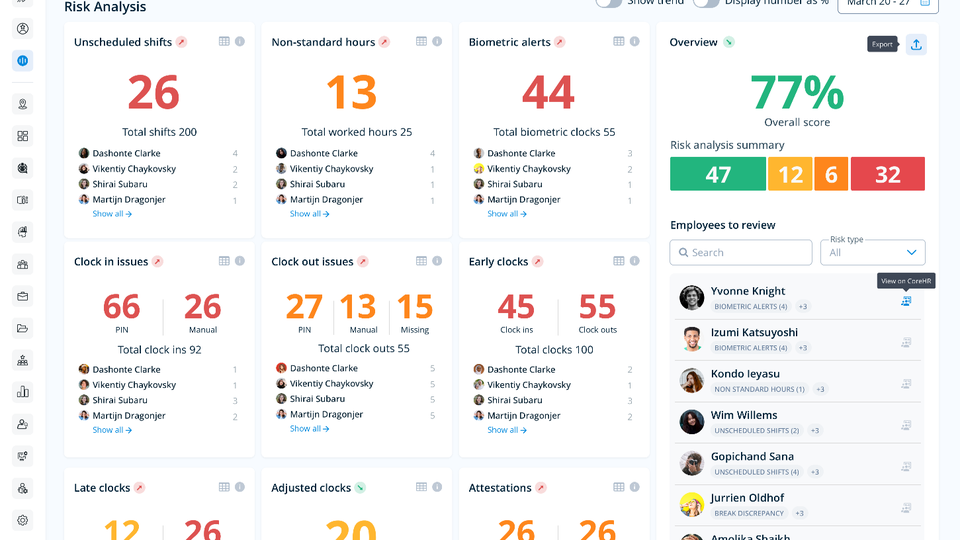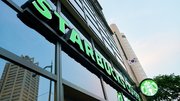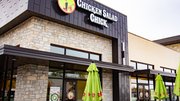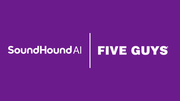Technology
Dave's Hot Chicken franchisee fights labor lawsuits with biometrics
Cody Wong, president of CW Strong, a franchisee of Dave's Hot Chicken and Carl's Jr, dicusses how implementing a labor management platform is saving his business thousands of dollars.

November 3, 2025 by Cherryh Cansler — Editor, FastCasual.com
Facing a deluge of labor lawsuits and mounting compliance pressure, California's restaurant industry is rapidly adopting technology, including biometrics and real-time alerts, to fortify operations and curb costly violations.
California businesses confront an average of one to two lawsuits per week, while 91% of hourly service workers experienced at least one labor violation in the past year. In response, restaurants are investing in "defensive infrastructure" featuring biometric data collection, real-time violation alerts and comprehensive audit trails.
CW Strong, a franchisee of Dave's Hot Chicken that plans to scale from 15 to 40 California locations by 2027, is one company embracing this defensive infrastructure.
"As we continue to grow our business from a midsize organization to a large enterprise, quality of service and people become our two biggest factors," President Cody Wong said in an email interview with FastCasual. "Having the right tools in place allows us to scale properly without having to worry about growing pains on that side of the operations."
Biometrics tackle time theft, ghost employees
Wong detailed the impact of implementing a labor management platform, Harri, across his enterprise, noting the most significant savings were realized at his Carl's Jr. locations in the San Diego market.
"This issue was not prevalent with our Dave's locations because we had Harri implemented from the very beginning," Wong said. "These issues were seen at our Carl's Jr. locations where buddy punching and time theft was a real issue."
The introduction of biometric punching was key to eliminating "ghost employees," cutting manager overtime in half, and reducing meal break premiums by 25% at those Carl's Jr. locations.
Wong pointed out the difficulty of manually tracking violations across over 50 locations.
"An employee stealing just two to three minutes a day is not something that any report would show before, but once we switched over to Harri that was almost completely eliminated," he said.
Fryer: 'Automation is the only defense'
The push for compliance and operational efficiency is heightened by California's volatile labor landscape, including legislation like AB 1228, which significantly increased labor costs for many fast-food operators. Wong estimates the law added $7 million-plus to the company's labor costs within a year.
"We never know what new laws will come into place that could have huge impacts to our bottom line like that again," Wong said. "The best we can do is to prepare ourselves for everything."
Luke Fryer, CEO of Harri, argues that for operators in the state, this preparation must be digital.
"For restaurants operating in California, technology isn't just a competitive edge — it's the only sustainable defense against an unforgiving regulatory environment," Fryer told FastCasual in an email. He explained that California's labor compliance is not a single law, but "a maze of interlocking regulations" where even small errors can trigger compounding penalties of $100 per employee, per pay period.
Fryer warns that operators are essentially "flying blind" as 91% of hourly workers experience at least one violation, but fewer than 25% file complaints. The Harri platform acts as a digital safety net by automatically flagging potential violations and prompting corrective action before penalties occur.
He said the platform's risk analysis dashboard identifies systemic issues, while digital infrastructure manages the precision required for waivers, referencing the Bradsbery v. Vicar Operating ruling. "One missing signature can mean tens of thousands in fines," he said.
ROI beyond compliance: Recruiting, retention
Fryer stressed that the technology offers value even in states without strict laws by helping businesses become an "employer of choice."
"Posting schedules well in advance, ensuring adequate rest periods between shifts and giving employees control over their lives are more than compliance checkboxes — they're competitive advantages," Fryer said.
Providing predictability through automated scheduling and easy shift swaps reduces turnover, which directly impacts the bottom line.
The technology also delivers on operations. Wong said features like sales forecasting and in-app shift switching free up managers to focus on the customer experience, which "drives customer satisfaction and keeps them coming back."
"Once the GMs are able to fully utilize Harri to its full potential, they can really make impactful decisions that save them a couple of hundreds of dollars a day," Wong said.
Cost, ROI
Fryer said Harri's monthly costs are determined by the number of locations and employees and are comparable to other workforce management systems.
"ROI is typically achieved within weeks of implementation," Fryer said, noting that for brands scaling like CW Strong, the platform eliminates compliance risks while delivering daily operational savings.
However, Fryer emphasized the true cost is that of not having these systems. He cited recentCalifornia Department of Labor cases that resulted in significant fines: $469,000 in back wages and damages for 114 employees across five locations, and $824,405 for 102 workers across four locations.
Wong acknowledged the industry's historical reluctance to change but stressed the long-term benefit.
"Convincing our management team that they would actually save money/time in the long run was somewhat difficult," he said, but a smooth rollout helped managers quickly realize the benefits.
 ChatGPT
ChatGPT Grok
Grok Perplexity
Perplexity Claude
Claude












